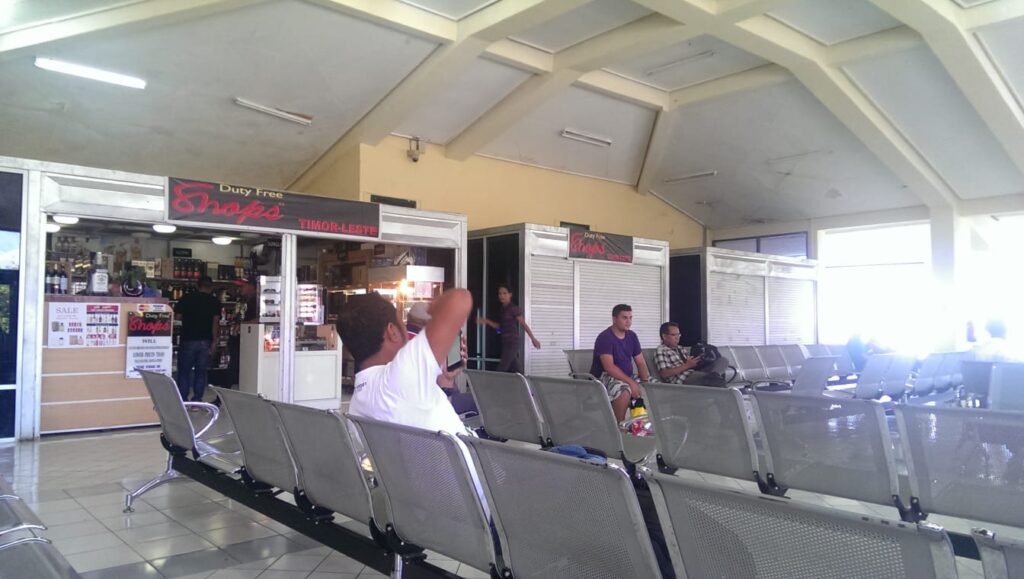For my first oversea assignment outside of Jakarta, I was sent to Timor-Leste’s capital, Dili. A very peaceful place, where life seemed to be running in it’s own, cool pace. We were sitting in a meeting room, deeply engaged in the conversation, when I saw something moving near the ceiling. First peeked the head and then the whole body. It was a mouse! And I was the only one who could see it. Do I mention anything to our hosts? Will it embarrass them? Are there rules on how to manage such meeting interruptions in Timor-Leste? Let’s find out…
The “Bento Style”
If you read my other articles, you saw that I like to start by looking at the history. It’s a part of my bento writing approach.
Bento is a Japanese lunch box that contains a single portion of a balanced meal – everything you need to stay healthy. Following this approach, I try to create content bento boxes packed with information you want to know before you travel: business, history, culture and personal experiences.


Familiarizing myself with the past, helps me better understand the culture and the business context in each country.
Tu understand the present and anticipate the future, one must know enough of the past, enough to have a sense of the history of a people.
Lee Kuan Yew, First Prime Minister of Singapore
Timor-Leste Through History
The official name of Timor-Leste is Democratic Republic of Timor-Leste. The meaning of the name is interesting, though. The word timor comes from Indonesian/Malay word timur which means east. Leste means east in Portugese, so the name of the country literally means East-East. Sometimes the name East Timor is also used.

Ancient Era (35,000 Years Ago – 16th Century)
Archaeological evidence suggests the first inhabitants arrived around 35,000 years ago, likely descendants of Australoid and Melanesian peoples. Over time, Austronesian migrants brought agriculture, and Timor-Leste became divided into small kingdoms with complex social structures.
By the 13th century, Timor-Leste attracted traders from Southeast Asia, particularly Java and China. The island offered resources like sandalwood, beeswax, and slaves.
Colonial Period (16th – 20th Century):
European arrival began in the early 16th century. The western part of Timor was colonized by the Dutch, while Portugal established a colony in the east that lasted over 400 years.The Portuguese interacted with existing Timorese political structures based on kinship and alliances.
Japanese forces invaded East Timor in 1942, subjecting the population to harsh rule, forced labor, and famine. Tens of thousands of Timorese civilians perished during this brutal period. The ccupation ended in 1945 with Japan’s surrender and the authority was handed back to the Portuguese governor.
Indonesian Occupation (1975 – 1999)
Following Portugal’s withdrawal in 1975, East Timor declared independence. However, Indonesia invaded and annexed the territory. Decades of resistance by East Timorese and international pressure ensued. Estimates suggest tens of thousands of East Timorese perished during this period.
This earned Indonesia international sanctions, which lasted several decades. These sanctions included restrictions on arms sales and military cooperation with Indonesia by several countries and international organizations. The United Nations also imposed an arms embargo on Indonesia. Economic sanctions were not as widespread, but some nations reduced or suspended aid and investment to Indonesia. The sanctions began to be gradually lifted in the late 1990s and early 2000s. By 1999, following a referendum in Timor-Leste and its subsequent independence, many countries began to normalize their relations with Indonesia.
Road to Independence (1999 – 2002)
In 1999, a UN-backed referendum overwhelmingly favored independence. Following violence and destruction by pro-Indonesian militias, the UN established a peacekeeping force.
On May 20, 2002, Timor-Leste became the first new sovereign state of the 21st century.
Timor-Leste enjoys good relations with Indonesia today, and is a member of ASEAN.
Travelling to Dili for Christmas
My trip happened at the end of 2015, a week before Christmas. I knew that Timorese celebrated Christmas, but I wasn’t familiar with the customs and what to expect.
Dili airport was small but decorated nicely for the holidays. Christmas vibes spread throughout the city. It did not have the allure of big European cities like Vienna or Zagreb during Christmas, but there were Christmas trees, lights, and jingle bells everywhere. I went to the mall, did some gift shopping, and then headed back to my hotel to get ready for the meeting.




Meeting Interrupted
I was preparing heavily for it, as if the future of my company depended on it. Like I mentioned, it was a special trip in my books because it was my first overseas assignment (outside of Indonesia, that is) and I travelled there alone.
I felt good with what I knew, yet I was concerned about the unknown. It was like getting ready for a big test—you’ve studied, but you’re nervous about the one topic you didn’t cover well. Little did I know, a test was waiting for me just around the corner!
The meeting started off good. There were four of us in the room, two hosts, my partner and I. We were sitting in a meeting room, deeply engaged in the conversation, when I saw something moving near the ceiling. First peeked the head and then the whole body. It was a mouse! And I was the only one who could see it. Do I mention anything to our hosts? Will it embarrass them? Are there rules on how to manage such meeting interruptions in Timor-Leste?
Managing the Situation
My instant reaction was just to ignore it. My hosts were very friendly and pleasent and I did not want them to feel unease. After all, this is something which they don’t have any control over, so why bother, ey?
The mouse went back and forward for few minutes and then peacefully returned to its hole. Interruption over, nobody noticed (but me) so did it really happen?
Looking at the broader context, things were flowing nicely:
- our conversation was engaging
- we were on the point
- the atmosphere was neutral – they had a problem and were interested to hear about the solution I had to offer (which was the whole purpose of the visit!).
So what good would come from breaking this flow?
None, I’m sure.
Sometimes interruptions are needed and welcomed. Like when negotiations are not going well and you need a distraction or a diversion to help you sidetrack the discussion. But this wasn’t one of those situations.
The Outcome
It was a standard technical meeting with questions and answers, explaining the flows and the solution, talking about the architecture, deployment etc. I took home some questions which I had to discuss with the product team and that was it! We shook hands, said so-long and I was out. Easy-peasy!
On my way to the hotel, I called the account manager to brief him. Did I mention the mouse? Nope. Didn’t feel it was important. But I believe I told him that they need the solution and that we could easilly provide it.
My part was almost done (I still had that homework to do) but it was back to the account manager now.
Oh, and the most important question you’re probably asking yourself – did they buy?
The answer is – no. But at least the outcome was not influenced by anything that happened in that meeting.
Sightseeing in Dili
I had the afternoon and evening to explore the city. One of the main attractions in Dili was the statue of Jesus Christ built on top of the hill overlooking the city. It’s like the one in Rio de Jainero, but smaller.
As I was driving there, I noticed how sleepy and quiet Dili was. Here and there I saw some bars and coffee shops, but not too many people. Buildings were small and simple, kids running around narrow streets, many barefoot, but all happy and smiling. Nothing unusual, after all it was Christmas time.






The car dropped me off at the foot of the hill and I had to climb some stairs to reach the top. The statue, called Cristo Rei, was a gift from Indonesia, built in 1996, while Indonesia still ruled East-Timor. The statue has some hidden symbolic meaning:
- It is 27m high, to reflect the integration of East Timor as the 27th province of Indonesia.
- The statue and globe it stands on are 34m high, i.e. two times 17, an allusion to 17 July 1976, the day East Timor was integrated into Indonesia, and 17 August 1945, the day Indonesia proclaimed independence from the Netherlands.
I took some pictures, and as it started to get dark, returned to the hotel.
Conclusion
I’ve seen and witnessed many unconventional things since this. Some of them I’ll share here on Demopedia, and some I will keep for myself. But I wanted to share this story because of the significance it has for me and because there are lessons to learn.
My takeaways from this are:
- Be mindful and don’t disrespect your partners and customers. Many nations and businesses across Asia follow a strict hierarchy. You need to learn to be pleasant and not disrespectful towards others if you want to exist in this environment. Had I mentioned the mouse to my hosts, it might have derailed the meeting and the ending could have been very different. This does not mean that you need to accept everything blindly, but you need to know how to handle rejections politely. There are many nuances, and I’ll continue tackling some aspects of it in my future stories.
- You will have great meetings, and still won’t make a sale. This happens and it’s quite normal. Reasons can be many – focus changed, budgets rerouted, regulations updated…you name it. The important thing is to learn from every interaction. Analyze the situation and identify good and bad parts. Repeat the good things and improve the bad ones.
- Manage interruptions. If an anomaly such as this one occurs, ask yourself would you gain anything by interrupting the meeting now. Do you need a distraction, or would breaking the flow just hurt you? In order to answer this, you should first know what is your objective and be sure you’re reading the situation in the room well.
Following these rules kept me from falling into mouse trap many times. I hope they will benefit you too.



0 Comments